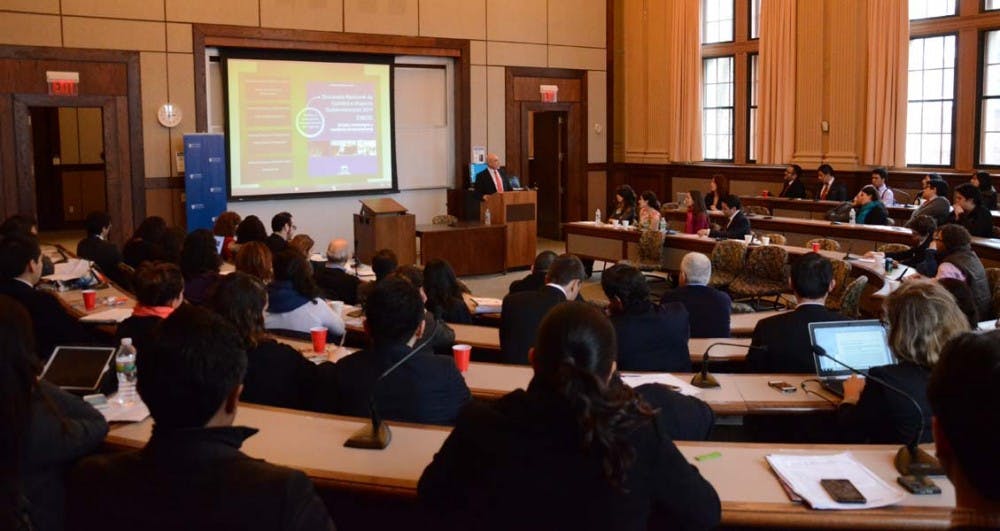
Last weekend, students of all nationalities “converged” for a discussion of the future of Mexico.
Convergencias 2013 — an annual conference organized this year by the student group Mex@Penn — brought together a host of Mexican academics, professionals and students to have a dialogue on Mexico’s current situation and place in history.
Penn and Yale University have alternately hosted Convergencias since 2007. This year, the conference — held in Silverman Hall — took “Mexico 2013-2023: Putting the Next Decade in Perspective” as its theme.
On choosing this long-sighted focus for the conference, Engineering sophomore and Mex@Penn secretary Karla Fausto said, “We just had political elections last summer, and usually the president holds office for six years, so this is the person who’s going to shape our lives. And we want to talk about where Mexico is going for the next 10 years.”
Among the prominent guests invited to the conference was Eduardo Sojo, who received in 1983 a master’s degree in economics and a Ph.D. in finance and industrial organization at Penn.
Sojo is president of the National Institute of Statistics and Geography of Mexico, also known as INEGI. During his presentation, he discussed some of the programs that INEGI has created to coordinate the country’s vast stores of geographical and demographic information.
Sojo said that INEGI — an autonomous agency of the Mexican government — has made this kind of data more accessible to citizens.
Today, INEGI uses interactive data cubes to make available certain information based on interests. These cubes allow their users to select from the available information in INEGI’s database to build a specific table for presentations.
“You just need to go to the web page and access the data without asking anyone,” Sojo said. “It is free, and it is accessible, and I have never seen anything like this in any other country in the world.”
Throughout his presentation, Sojo showcased INEGI’s numerous data sets: research to investigate government corruption, security levels, weather treatment issues and household expenditures, among others.
However, among this ocean of data, one statistic interests Sojo more than the rest: the measure of well-being and progress.
“Our satisfaction with the country we live in, we rank only 6.8 [out of 10],” he said. “We’re always saying good things about Mexico, but the rank shows differently.”
After Sojo’s presentation, Ahmad Chaudhary — a Pakistani student in the Fels Institute of Government — said the event was very absorbing. “I wanted to learn about how Mexico is approaching its challenges and bring [solutions] back to Pakistan,” he said.
Porfirio Diaz Gonzalez, a master’s student at Georgetown University who has lived in the United States since August 2012, said he had heard of INEGI previously. However, he said, “I didn’t know the level of their work and found it very surprising. If I knew about it back in Mexico, I would have used it at my work.”
And to most in attendance, Convergencias was more than just a weekend of intellectual discussion. It was also a home away from home.
“You miss your language, you miss your jokes, and when you’re here, you kind of forget where you came from,” Fausto said. “This conference sort of returns to you your sense of purpose for coming to the [United States]. It reminds you that you are part of something that’s greater than yourself.”
The Daily Pennsylvanian is an independent, student-run newspaper. Please consider making a donation to support the coverage that shapes the University. Your generosity ensures a future of strong journalism at Penn.
DonatePlease note All comments are eligible for publication in The Daily Pennsylvanian.





